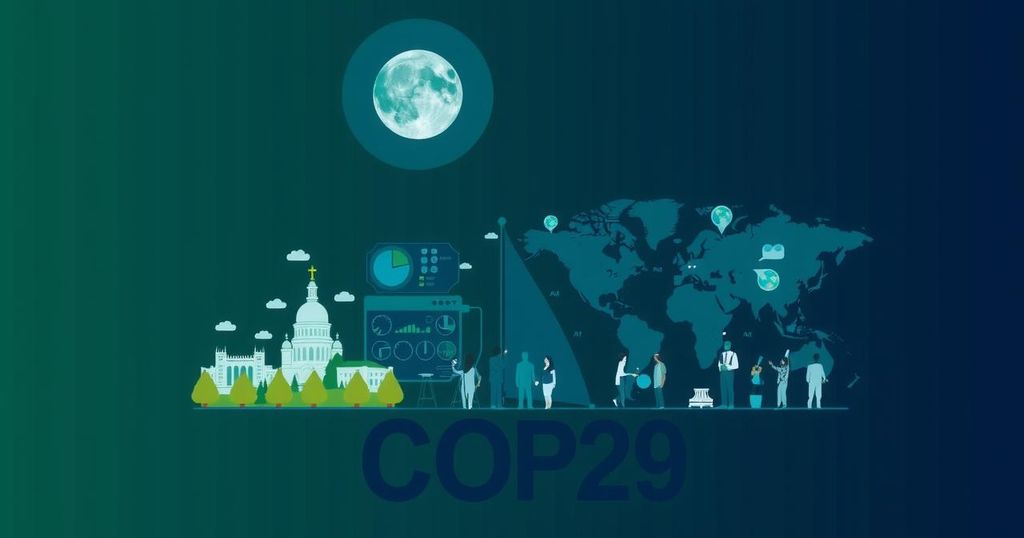COP29, starting on 11 November 2024 in Baku, aims to establish new global climate finance targets amidst urgent calls for climate action and peace initiatives. With the backdrop of rising military expenditures and increasing climate crises, there are concerns about the efficacy of the Azerbaijan-led ‘COP of Peace’, especially considering the need for addressing military emissions. Collective action and advocacy for climate justice and accountability remain crucial as the summit approaches.
The upcoming COP29, scheduled to commence in Baku, Azerbaijan, on 11 November 2024, presents an opportunity for global leaders to establish a new climate finance target. Historically, the last significant commitment in 2009 resulted in an agreement for developed nations to provide $100 billion annually to assist developing countries in mitigating climate impacts. However, with a successful yet delayed fulfillment of that promise in 2022, there is now a pressing need for an updated approach to climate finance and national commitments in light of the escalating climate crisis. This COP is also framed as the “COP of Peace,” spearheaded by the Azerbaijan presidency, which aims to implement initiatives focusing on the intersection of climate action and conflict resolution. A proposed “COP truce” encourages conflicting parties to cease hostilities during the summit, thereby promoting a conducive atmosphere for negotiations. However, concerns arise regarding Azerbaijan’s intentions, given its challenging human rights history and reliance on fossil fuel revenues. Activists raise valid points about the risks of using climate action rhetoric to overshadow militarism and the military’s impact on climate change. True progress would necessitate addressing military emissions, which represent 5.5% of global emissions, significantly surpassing total emissions from 54 African nations, collectively contributing only 4%. Recognizing military expenditure as a critical barrier to climate justice, efforts must pivot towards redirecting military funds towards climate initiatives. In 2023, global military spending peaked at an unprecedented $2.4 trillion, a sum that coincidentally matches the financial requirements for aiding developing nations in transitioning towards renewable energy. In response to the sense of despair and fragmentation arising from ongoing global conflicts and environmental disasters, there is a call for collective action. The author encourages individuals to gather strength in unity, confront the injustices of inadequate climate funding, and demand accountability from governments. The call to action extends to signing petitions advocating for climate loss and damage financing, conversing with local representatives on climate issues, and engaging in grassroots movements. As COP29 approaches, the emphasis must be on transforming militaristic funding into substantial climate finance. It is imperative to cease the allocation of resources to military fortification and instead invest in restorative practices that address climate-induced harms and support affected communities. By standing together, individuals can advocate for a new approach to climate justice and peace, acknowledging the intertwined nature of these critical issues.
The significance of COP29 is underscored by its timing and location in Baku, Azerbaijan, where discussions will focus on the urgent need for enhanced climate finance and commitments against the backdrop of rising global military expenditure amid accelerating climate breakdown. Historically, leaders have committed to financial assistance for developing nations, yet fulfillment has often lagged, signaling a need for more substantial and immediate action. Additionally, the Azerbaijan presidency’s signaling for COP29 as a ‘COP of Peace’ reflects a broader acknowledgment of the crucial link between climate disruption and conflict, alongside an advocacy for temporary ceasefires. However, skepticism remains regarding the seriousness of these initiatives amidst ongoing militarism and human rights concerns, raising questions about effective solutions to climate crises and their intertwined nature with conflict and militarism.
In conclusion, COP29 presents a pivotal platform for world leaders to redefine climate finance and address the intertwined challenges of climate change and militarism. The vision of a ‘COP of Peace’ necessitates rigorous accountability regarding military emissions, coupled with a genuine redirecting of military spending towards climate justice. Only by acknowledging and confronting the substantial impacts of militarism on the environment can meaningful and sustainable progress be achieved. The collective call to action encourages individuals and communities to demand accountability and promote a holistic approach to combating the climate crisis.
Original Source: www.quaker.org.uk






